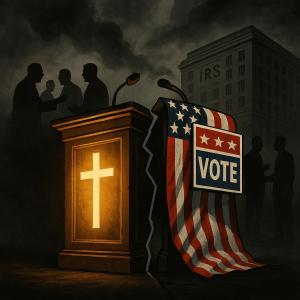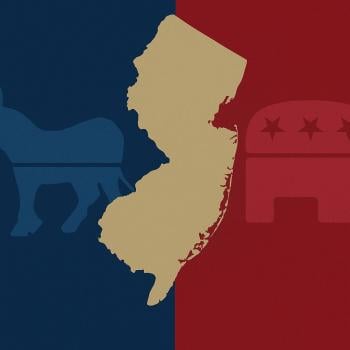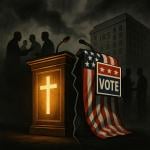
Religious organizations and leaders have begun responding to the Internal revenue Service’s relaxation on a rule that prohibited pastors and other religious leaders from endorsing political candidates from the pulpit without forfeiting their tax-exempt status. This recent pivot comes not from legislation, nor from the repeal of statute, but through a joint legal filing submitted in federal court. The plaintiffs: two churches and the National Religious Broadcasters Association. The defendant: the United States government. The contention: that the 1954 Johnson Amendment violates the First Amendment rights of religious institutions and their leaders.
The IRS, for decades the silent enforcer of the rarely used statute, has now conceded—at least in this case—that certain church speech falls beyond its prosecutorial reach. When pastors speak to their congregations during regular worship services about electoral issues “viewed through the lens of religious faith,” such speech shall not, per the IRS, be construed as political intervention.
William Droel, a Catholic writer and founder for National Center for the Laity, wrote that despite the recent shift allowing churches to endorse political candidates, Catholic leadership remains firmly opposed. He states that the U.S. Conference of Catholic Bishops (UCCB) has consistently reaffirmed its stance that churches should avoid direct involvement in partisan politics. Read More Here
Former Oklahoma State Representative Rebecca Hamilton, who is a Catholic, wrote she was surprised that the UCCB’s reaction to the IRS’ change saying “Trump would never have been elected if America’s churches hadn’t campaigned for him. “Christian” religious leaders lied for Trump, slandered for Trump, denied the Gospels for Trump, dismissed the Ten Commandments for Trump and put Jesus Christ out of their churches for Trump.” Read More Here
Faithful Politics writer John San Nicholas, who covers the intersection of faith and politics, believes most pastors won’t endorse politicians. He also countered the “pastors stumping for Trump” view citing a Harvard study that evangelical pastors are far less political in their preaching than mainline pastors, who tend to me more progressive. Regardless, he wrote “this is a symbolic victory for the Christian culture warriors who have been waging this battle against the Johnson Amendment for decades. For these activists, this development is a sign that they are winning back America’s soul for God.” Read More Here
Some Christian organizations are using the IRS shift to train clergy on the change. The Family Foundation, a public policy organization in Kentucky, has released what they are calling”a new resource and Q&A for Pastors and Churches on what the IRS ruling on church endorsements really means.”
“We are incredibly thankful that the IRS has confirmed what we have always known—that churches have the freedom to discuss political issues and candidates from a Christian perspective,” said David Walls, executive director of The Family Foundation, in a release.
Meanwhile, the Johnson Amendment remains law—unrepealed, unrevised, and still visible on the IRS’s own website, which states plainly that 501(c)(3) organizations may not “participate in, or intervene in… any political campaign.” But this recent filing—submitted to the U.S. District Court for the Eastern District of Texas— argues that certain types of speech, made in certain contexts, fall outside that prohibition.
Supporters of the shift, many of whom populate America’s religious right, point to the First Amendment’s free exercise and free speech clauses. For them, the ruling is not a loosening of law but a restoration of liberty.
But opposition has emerged as swiftly as celebration. A broad coalition of religious and secular critics alike argue that the ruling risks transforming sacred spaces into campaign staging grounds. It is here—between the law and its application—that the current controversy rests.
Many argue that The Johnson Amendment, authored by then-Senator Lyndon B. Johnson, was intended to curtail the political power of nonprofits, not to muzzle pastors. But in the years since, the line between faith-based guidance and political speech has blurred, particularly in the marriage of evangelicals and the GOP.
President Donald Trump, who long campaigned on abolishing the Johnson Amendment, signed a 2017 executive order directing the Treasury to relax enforcement. Critics at the time dismissed the order as symbolic. Now, they aren’t so sure.










